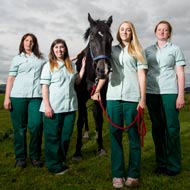
Scottish team share knowledge to improve welfare
Student veterinary nurses are heading to India next month in a bid to improve standards of animal care and raise awareness of the nurse's role.
Nursing students from Edinburgh Napier University will travel to Kerala Veterinary and Animal Sciences University - one of India's most respected veterinary universities.
Alongside experts from the Jeanne Marchig International Centre for Animal Welfare, they will demonstrate how vets and nurses can work alongside each other to prepare animals for surgery.
Hayley Walters, welfare veterinary nurse at the Jeanne Marchig Centre, said: "An animal's experience can be improved dramatically when nursing care is provided by a knowledgable, well trained and compassionate individual.
"Veterinary nurses are in the perfect position to do this."
Yet despite India's booming pet population, the country has no official recognised scheme for veterinary nurse training or qualification.
Often, developments within veterinary training institutes around the world focus on technology and the training of vets, said Dr David Smith, programme leader at Edinburgh Napier.
"However, good welfare of hospitalised animals starts before the consultation room and long after medical or surgical intervention; this is the domain of the veterinary nurse," he added.
During their 10-day visit, the Edinburgh team will share knowledge and clinical techniques that can have a substantial impact on animal welfare.
They will also share best practice in hygiene and infection control, work with colleagues in Kerala to provide training in animal care and explain how to recognise and manage animal pain.
Natalie Maxwell, a veterinary nursing student from Edinburgh Napier, who will be joining the trip, said: "We are excited to have the opportunity to learn from our colleagues in India and to experience caring for animals in an environment that brings challenges we haven't faced before."
Photographs courtesy of the University of Edinburgh



 The veterinary mental health charity Vetlife is inviting the veterinary community to join it for a sponsored cold-water dip.
The veterinary mental health charity Vetlife is inviting the veterinary community to join it for a sponsored cold-water dip.